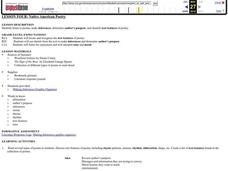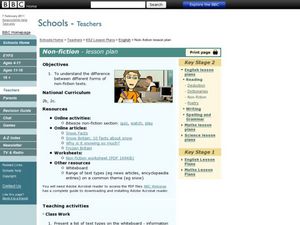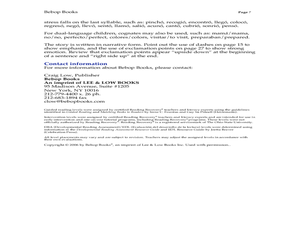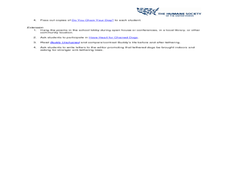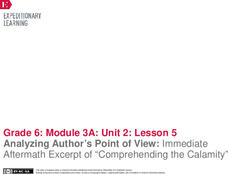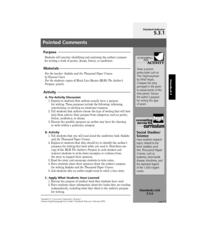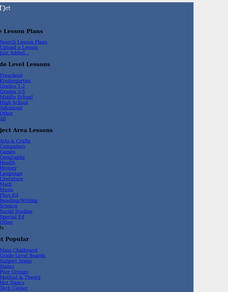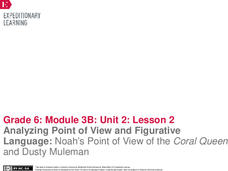Curated OER
My Name is___________.
Read to gain an understanding of the author's intent or purpose. Learners analyze a persuasive text, identify the author's purpose, and evaluate the claims used as support. They then compose a persuasive essay of their own.
EngageNY
Considering Author’s Purpose: Comparing Fictional and Historical Experiences of the Second Sudanese Civil War (Chapters 14 and 15, Plus Rereading “Time Trip,” Continued)
Is that a true story? Readers work to gather evidence for comparing the historical and fictional text Time Trip: Sudan’s Civil War and A Long Walk to Water. Scholars identify the use of real people and experiences versus the use of...
Curated OER
Native American Poetry
Identify text features, make inferences, and discover the cultural significance of Native American Poetry. Sixth graders read several Native American poems and use graphic organizers and literature response logs to record their feelings...
Curated OER
Find The Hidden Message: Media Literacy in Primary Grades
Learners practice listening to and reading various types of media and text. In groups, learners use video, newspapers, magazines, and more to compare and contrast different types of information. They identify the differences between fact...
Curated OER
Non-Fiction Texts
Third graders examine different types of non-fiction texts. In this non fiction lesson, 3rd graders use different types of texts to gather information. Students work in groups to analyze the texts for author's purpose, common themes, and...
Curated OER
Guided Reading with Elizabeti's Doll
Practice reading strategies using Elizabeti's Doll by Stephanie Stuve-Bodeen. Readers utilize decoding and comprehension strategies before, during, and after reading the story. A detailed list of text features, high frequency words,...
Curated OER
Lesson 2: Identifying an Author's Purpose (part 2)
Keep reinforcing the concept of author's purpose with a practice activity. After discussing the three purposes of writing, third graders will complete a graphic organizer intended to help them pin point textual evidence that proves...
Curated OER
Author's Day
Have your learners choose an author to study. One resource link gives a list of approved authors. Scholars read at least three works produced by that author and produce three separate book reports as well as a two-page author report....
Curated OER
Identify Purposes of Text
Set a purpose for reading informational texts with this reading lesson. To find the central idea of a text, young readers turn titles and subtitles into questions to help them understand the text. They complete a T-chart for the lesson,...
Curated OER
Poetic Justice: Understanding the Life of a Tethered Dog
The Humane Society provides a lesson in which class members explore the issue of tethering dogs. Through the resources used -- a comic, a poem, and narrative and expository writings -- class members realize that messages can be conveyed...
EngageNY
Analyzing Author’s Point of View: Immediate Aftermath Excerpt of “Comprehending the Calamity"
Analyze that! Scholars continue reading and analyzing a primary source about the immediate aftermath of the 1906 San Francisco fire and earthquake. Then, individuals use graphic organizers to identify the author's point of view.
Idaho State Department of Education
Lessons for Social Studies Educators
Point of view, purpose, and tone: three concepts readers of primary and secondary source materials must take into account when examining documents. Class members view a PowerPoint presentation and use the SOAPS strategy to identify an...
Curated OER
Author's Purpose
Middle schoolers identify the key components to determining the author's purpose in literature. They read a short selection and answer four key questions. Student chart the responses. They discuss the responses and identify the author's...
Curated OER
Card Catalog Cards
Prepare learners on how to use the library's card catalog system as well as the online version. Author, card catalog, the Dewey system, and so much more is addressed. This would be a great tool to use in the classroom or library.
Curated OER
Fiction vs. Nonfiction
Students explore fiction and nonfiction writing. They identify the elements of fiction in a short story and identify the criteria necessary in a nonfiction piece. Students distinguish the author's purpose in an expository text,...
Curated OER
Reader's Theater, Get Ready
Students recognize what features make a play. For this reader's theater lesson, students read the play Master Man: A Tall Tale of Nigeria told by Aaron Shepard and determine what features make this a play and what the author's purpose was.
Curated OER
Pointed Comments
Fifth graders analyze pieces of writing to identify the author's purpose of writing. In this writing lesson, 5th graders consider a variety of pieces of writing such as, poetry, drama, fiction, and non-fiction. Each student completes an...
Curated OER
Changing the Point of View
Fourth graders identify the point of view. In this point of view lesson students compare and contrast the point of view from third person omniscient and first person. Students rewrite a paragraph in an alternative point of view.
K20 LEARN
It's All About Balance! Parallel Structure
I came, I saw, I conquered! Parallel structure, employed by writers even before Julius Caesar, is the focus of a instructional activity that teaches young writers the power of this rhetorical device. Class members analyze speeches by Dr....
Curated OER
Gary Paulsen's Canyons: Question the Author (QtA) Strategy
Gary Paulsen’s Canyons is the focus of an exercise that models how to read closely using a Questioning the Author (QtA) strategy. Complete directions for the strategy, which can be used with any text, are included in the richly-detailed...
Curated OER
Awesome authors (Elementary, Reading/Writing)
Fifth graders use technology to research and collect data. They develop awareness and appreciation of authors and genres. They organize information for presentation.
Curated OER
Identifying the Theme in a Story
Students recognize Theme through the use of simple, short stories. Using Pro Quest, students begin by researching the literary element, theme, and how it can be identified. They then identify the themes in Aesop's Fables and other short...
Maine Content Literacy Project
Introduction to Short Story Writers Say
There are so many authors of short stories, and your class can have the chance to study quite a few. This seventh lesson in a series of fourteen continues the decision-making process for the final assessment: a short story author study....
EngageNY
Analyzing Point of View and Figurative Language: Noah’s Point of View of the Coral Queen and Dusty Muleman
Literally, what's the meaning? Scholars read pages seven through nine of Flush and discuss literal and nonliteral meaning with figurative language. Learners work in triads to identify and define unfamiliar words. They then complete a...




